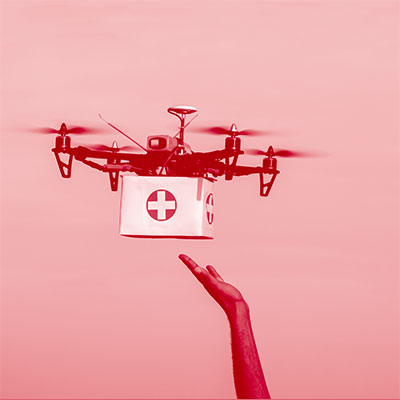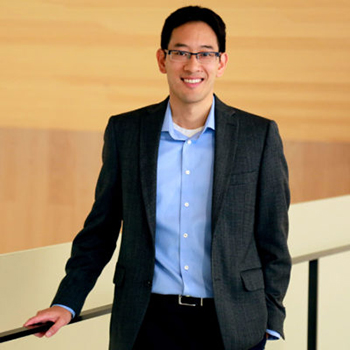Published: February 4, 2022

Cardiovascular disease, a term for a number of disorders of the heart and blood vessels, is a serious and steadily growing threat to global health, causing even more deaths every year than cancer. In the U.S. alone, nearly 660,000 people, or 1 in 4, die of heart disease annually.
In particular, cardiovascular disease can lead to cardiac arrest, a serious condition in which the heart suddenly stops beating. One of the most effective methods of treatment for cardiac arrest is an automated external defibrillator, which can not only correct an episode of arrhythmia, or irregular heartbeat, but can restore the heart’s beating if it suddenly stops.
As with any medical emergency, time plays a critical factor and this is particularly true when someone is experiencing cardia arrest. Even a minute delay in defibrillation can leading to a 10% decrease in survival.
My guest today, Timothy Chan with the University of Toronto, is conducting incredible research exploring how drone technology can minimize delays in defibrillation for individuals in crisis, potentially even faster than traditional EMS can respond.
Let’s say you witness a cardiac arrest or you see someone collapse on the sidewalk. The first thing you’d do is probably call 911, then the 911 operator would send an ambulance, and then in drone-equipped jurisdictions they’d dispatch the drone as well. So you being the bystander are going to start doing CPR and the idea is that the drone gets there hopefully within a few minutes, which would be ahead of when the ambulance arrives.
Interviewed this episode:

Timothy Chan
University of Toronto
Timothy Chan is the Canada Research Chair in Novel Optimization and Analytics in Health, a Professor in the department of Mechanical and Industrial Engineering, the Director of the Centre for Analytics and AI Engineering, the Associate Director, Research and Thematic Programming of the Data Sciences Institute, and a Senior Fellow of Massey College at the University of Toronto. His primary research interests are in operations research, optimization, and applied machine learning, with applications in healthcare, medicine, sustainability, and sports. He received his B.Sc. in Applied Mathematics from the University of British Columbia (2002), and his Ph.D. in Operations Research from the Massachusetts Institute of Technology (2007). Before coming to Toronto, he was an Associate in the Chicago office of McKinsey and Company (2007-2009), a global management consulting firm. During that time, he advised leading companies in the fields of medical device technology, travel and hospitality, telecommunications, and energy on issues of strategy, organization, technology and operations.
Episode Transcript
Ashley Kilgore:
Cardiovascular disease, a term for a number of disorders of the heart and blood vessels is a serious and steadily growing threat to global health, causing even more deaths every year than cancer. In the US alone, nearly 660,000 people, or one in four die of heart disease annually. In particular, cardiovascular disease can lead to cardiac arrest, a serious condition in which the heart suddenly stops beating. One of the most effective methods of treatment for cardiac arrest is an automated external defibrillator, which cannot only the correct an episode of arrhythmia or a regular heartbeat, but can restore the heart beating if it suddenly stops.
Ashley Kilgore:
As with any medical emergency, time plays a critical factor. And this is particularly true when someone is experiencing cardiac arrest. Even a minute delay in defibrillation could lead to a 10% decrease in survival. My guest today, Timothy Chan with the University of Toronto is conducting incredible research, exploring how drone technology can minimize delays in defibrillation for individuals in crisis, potentially even faster than traditional EMS can respond.
Ashley Kilgore:
Tim, thank you so much for joining me. I have to say your work sounds absolutely fascinating, and I just can’t wait to dive in.
Timothy Chan:
Thanks a lot for having me.
Ashley Kilgore:
To start, I would really like to paint a clear picture of how significant the factor of time is when an individual is experiencing cardiac arrest. Can you share just how much of an impact time to defibrillation can have on survival rates?
Timothy Chan:
Cardiac arrest is pretty much the time sensitive emergency. Studies have shown that the odds of survival fall pretty quickly, roughly 10% per minute delay in treatment. Overall, although survival rates vary from geography to geography, they’re quite low in general, but fortunately, defibrillating a victim, starting CPR and applying a defibrillator can double or potentially triple their chances of survival.
Ashley Kilgore:
So Tim, we’re hearing more and more about the developing potential for drone technology within the medical community. Just a couple of years ago here in the Informs’ hometown of Baltimore, the very first transplant organ was delivered via drone. Can you share a look inside the lifesaving work you’re doing with drones and transporting defibrillators?
Timothy Chan:
Yeah, absolutely. This is a very exciting area of research to me personally. I started working on this maybe seven or eight years ago. At the time, there was a graduate student in the Netherlands who designed a prototype drone, AED. AED stands for automated external defibrillator, where the AED was an actual part of the drone. And at the time I was already working on problems around optimizing static AED placements in a city with some medical collaborators. And so when news of this drone idea hit, we got to working on building models for optimizing a hypothetical drone network that could speed AEDs, the cardiac arrest victims.
Timothy Chan:
So since that initial work, we’ve taken this research in a lot of interesting directions. For example, recently we studied how to use machine learning to dispatch drones to emergencies, to balance effectiveness with cost. And even more exciting, we’ve been doing over the last, I would say year or two now, a series of test flights that have received Transport Canada approval, working with a drone company and local EMS agencies to actually see how this technology would work in practice, see what types of real world obstacles the drone will face, see if bystanders can actually run and grab an AED that’s dropped by a drone and use it effectively. So that’s super exciting. And even the issue of static AED optimization is ongoing. So not just looking at drones, but complimenting them with optimizing static AEDs placed in this city. For example, we’ve looked at recently how AED access was affected during COVID with all of the lockdowns and the shutdowns of different buildings, even how we can optimize the placement of AEDs to improve access across different socioeconomic groups. So there’s a lot of interesting directions for this research I think these days.
Ashley Kilgore:
As I noted in my opening, this approach can ensure defibrillators reach individuals experiencing an emergency even faster than EMS. How does that work?
Timothy Chan:
Let’s say you witness a cardiac arrest or you see someone collapse on the sidewalk, the first thing you do probably is to call 911, then the 911 operator would send an ambulance. And then in a drone equipped jurisdiction, the idea would be that they dispatch the drone as well. So you being the bystander you’re going to start doing CPR, and the idea is that hopefully the drone gets there within a few minutes, which would be ahead of when the ambulance arrives. So when the drone gets there, the drone itself could be the AED like that original prototype, or the drone might be carrying an AED in its payload and it will drop it or lower it down. And then the drone would basically depart and fly back to the base and be ready for the next mission while you would go grab the AED and apply it to the patient and hopefully defibrillate the patient even before the ambulance gets there. Those few minutes, even though it doesn’t sound like a lot, getting there ahead of the ambulance by a few minutes, that literally could be the difference between life and death.
Ashley Kilgore:
So knowing that the sooner a defibrillator reaches a patient the better, what is the extent to which these drone transported defibrillators can improve outcomes for patients experiencing cardiac arrest?
Timothy Chan:
Just as I mentioned, it can be quite significant. If you recall the time sensitivity of cardiac arrest, the 10% per minute, for example, those couple of minutes, even if the drone gets there two or three minutes ahead of the ambulance, that can literally be the difference between life and death. And if you recall, having a defibrillator there, being able to shock the patient, you can double or perhaps triple the chances of survival.
Ashley Kilgore:
Now Tim, I’m someone that lives in a rural area where it already can take EMS longer than say in urban or suburban areas to respond to a medical emergency, what kind of impact could this system have in a community like mine?
Timothy Chan:
It can have quite a significant impact. As you noted, rural and remote areas, for example, typically experienced longer EMS response times compared to urban areas. So having drones there can be a very significant advance in reducing the response time to cardiac arrest.
Ashley Kilgore:
Now, are there opportunities for this kind of drone delivery approach to be applied to improve the treatment timeframes for other conditions or medical emergencies?
Timothy Chan:
Absolutely. Consider an opioid overdose and a drone bringing a Naloxone kit, or a severe allergic reaction and a drone bringing an EpiPen, or a major car crash or other kind of trauma and the drone bringing a tourniquet or other supplies. I think eventually the idea of emergency medical drones will have really widespread applications, much like the broad utility of ambulances, but here really focusing on transporting supplies quickly.
Ashley Kilgore:
Tim, thank you again so much for joining me. It was really a pleasure to discuss your work with you. Before we wrap up, can you share what next up might be with your work?
Timothy Chan:
Sure. As much fun as the OR modeling and optimization is, I’m really energized about seeing this technology put into practice. You might have seen in recent news that in Sweden, in December, a drone carrying an AED was actually used on a live cardiac arrest patient and successfully resuscitated the patient. This is what I’m hoping as the first success story among many to come. I’m currently working with some collaborators to embed a drone intervention into a randomized clinical trial to measure its effectiveness, along with a host of other things like optimizing static AED placement and mobilizing neighbors to respond in an emergency. I think it’s very exciting to see how the OR we do is making its way into real world practice.
Ashley Kilgore:
Want to learn more? Be sure to check out the show notes, posted in conjunction with ORMS Today magazine online to learn more about what was discussed in this episode. The podcast is also available for download from Apple Podcasts, Google Play, Stitcher and Spotify. Wherever you listen, please take the time to do a review as that helps other listeners find the podcast. Until next time, I’m Ashley Kilgore and this is Resoundingly Human.
Want to learn more? Check out the additional resources and links listed below for more information about what was discussed in the episode.
Resources
Optimizing a Drone Network to Deliver Automated External Defibrillators, Circulation
First drone delivery of transplant organ in Baltimore, ABC 7 News
Drone network design for cardiac arrest, Manufacturing & Service Operations Management
